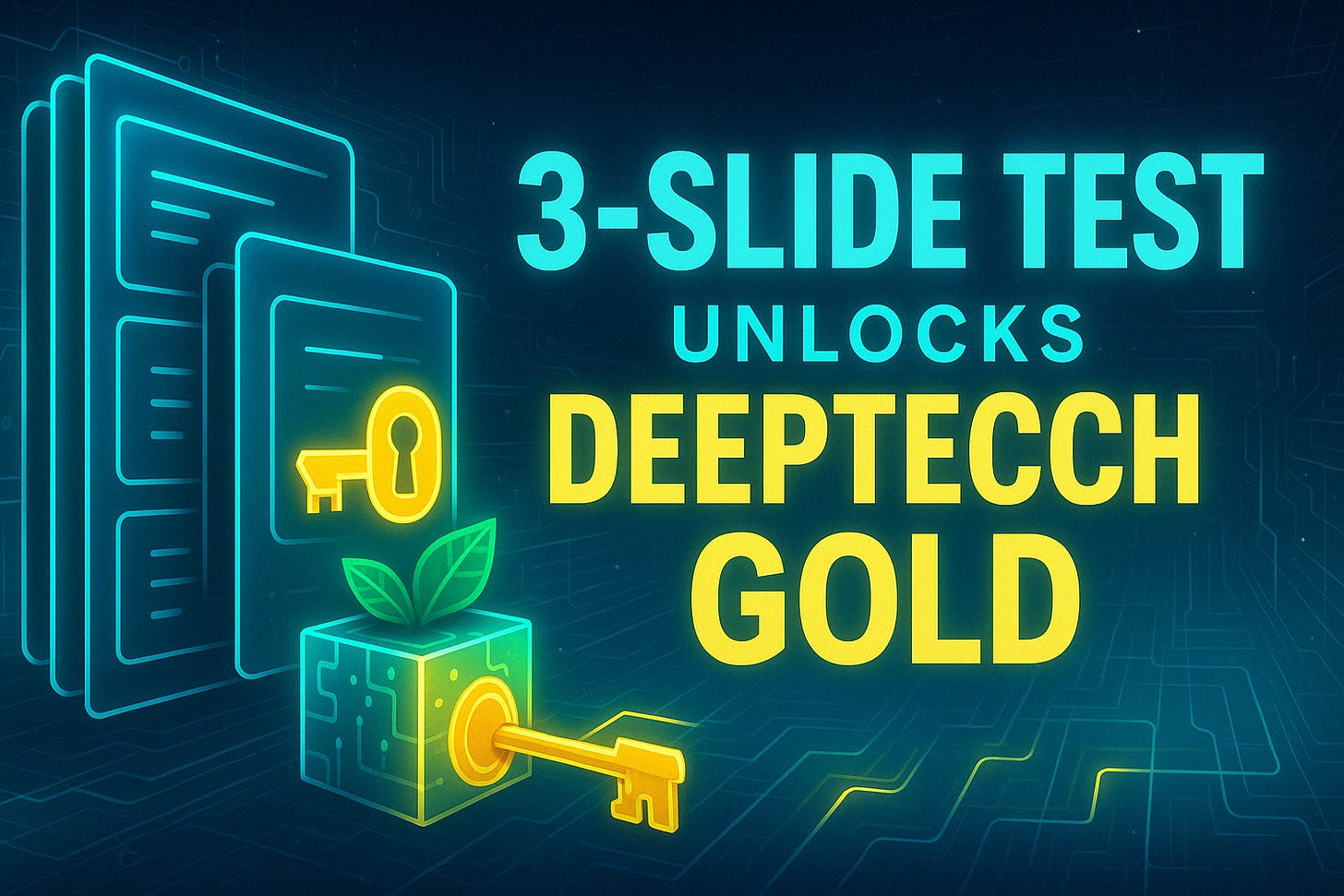💡3-Slide Test Unlocks Deeptech Gold: Spot Traction Titans Like Etched.ai—Seize Your 10x Edge Before Valuations Triple
Your Weekly Shortcut to Deeptech Investing — Trends, Startup Intel & Investor Playbooks for VCs & Angels in 5 Minutes or Less
I’ve got a quick trick to help you figure out if a deeptech startup’s pitch deck is worth your time—the 3-Slide Test. Deeptech startups, working on things like AI, quantum computers, or green tech, have big ideas, but 6 out of 10 fail because they can’t prove their tech works or find buyers (PitchBook, March 2025). By checking just three slides in their pitch deck, I can spot the ones with real traction, saving time and aiming for 5-10x profits in the $1 trillion deeptech market. As of April 20, 2025, here’s how I do it and how you can use this test to pick the next big winner!
What’s the 3-Slide Test?
A pitch deck is a startup’s story—10-15 slides explaining their tech, team, and plans. I zoom in on three slides—Problem/Solution, Traction, and Team—to see if they’re a good bet. Traction’s the big one: real proof their tech works and people want it, like customer contracts or test results. I’ve used this test to skip bad bets and back hits like DeepL before its $2 billion valuation (TechCrunch, May 2024). Here’s what I look for in each slide:
Problem/Solution Slide: Does it tackle a huge problem and offer a unique fix? I want a market worth $1 billion or more and a special edge, like patents or unique data. Etched.ai showed how chip shortages cost $50 million a year and their analog chips save 50% (Crunchbase, February 10, 2025).
Traction Slide: Are there customers, real-world tests, or grants? I look for contracts with big names (like the military or top companies), lab tests turning into products, or $1 million+ in funding. QuSecure’s contract with the U.S. Army proved its quantum security tech (Crunchbase, July 2024).
Team Slide: Are the founders experts with a track record? I want PhDs or people who’ve worked at big tech companies. CarbonCure’s CEO, Robert Niven, has 15 years in green tech and 10 patents (LinkedIn, March 2025).
Data shows 8 out of 10 pitch decks with a strong traction slide lead to deals that grow 3-5 times bigger within 18 months (PitchBook, January 2025).
Why This Matters for You
Deeptech’s a giant $1 trillion market—AI ($207 billion), computer chips ($70 billion), quantum ($6 billion by 2028)—and the biggest profits come from early investments (Statista, February 2025; BCG, February 2025). A $1 million investment at a $20 million valuation could grow to $50-100 million if the startup hits a $500 million to $1 billion sale, like Anduril’s $14 billion deal (Bloomberg, December 20, 2024). With early startup prices doubling to $30 million in 2024 (PitchBook, April 1, 2025), the 3-Slide Test helps you find winners fast before costs climb higher.
Startups with Awesome Pitch Decks
Here’s my list of startups whose pitch decks pass the 3-Slide Test:
Etched.ai: Solves chip shortages, Meta test project, ex-NVIDIA founders (Crunchbase, February 10, 2025).
QuSecure: Fixes quantum security risks, Army contract, NIST experts (Crunchbase, July 2024).
CarbonCure: Tackles concrete pollution, 700+ factory deals, green tech PhDs (Forbes, October 2024).
DeepL: Solves translation gaps, Siemens investment, ex-Google team (TechCrunch, May 2024).
Mythic AI: Cuts edge AI power use, drone tests, chip design experts (Crunchbase, October 2023).
These are real deals—check Crunchbase or their websites for their pitch decks.
Risks to Watch Out For
Even great pitch decks can hide problems:
Fake Success: 2 out of 10 startups exaggerate their customer deals—QuSecure’s Army contract needs checking on Crunchbase (July 2024).
Weak Teams: 3 out of 10 don’t have the skills to deliver—DeepL’s ex-Google team is a must (TechCrunch, May 2024).
Small Markets: 4 out of 10 target markets too small—Etched.ai’s $70 billion chip market is a safe bet (Statista, February 2025).
Always double-check traction on Crunchbase or LinkedIn to make sure it’s real.
My Game Plan for You
Here’s how to use the 3-Slide Test to pick winners:
Check the Problem/Solution Slide: Make sure they’re solving a problem worth $1 billion or more, like CarbonCure’s $50 billion green concrete market (BCG, January 2025).
Look at the Traction Slide: Check for customer contracts or test projects, like Etched.ai’s Meta deal (Forbes, March 2025). Crunchbase or news sites will confirm.
Review the Team Slide: Look for founders with PhDs or big-tech experience, like DeepL’s team (TechCrunch, May 2024). LinkedIn shows their backgrounds.
Invest Early: Put $5-10 million into startups valued at $10-50 million, like QuSecure’s $60 million valuation (Crunchbase, July 2024).
Spread Your Bets: Mix investments in Etched.ai ($1 billion), DeepL ($2 billion), and Mythic AI ($50 million) to lower risks from fake success.
The 3-Slide Test helps you find deeptech startups with real traction—5-10x profits are possible with CarbonCure or DeepL.
Join me on Instagram @eden_jana for exclusive insights, real-time updates, and insider tips on deeptech investments. Don’t miss out—follow now to stay ahead of the curve and stack those wins.
Stay sharp,
Eden Djanashvili
Author Invest Deeptech




